Was the Empire Really So Bad? Part 1: The Galactic Republic Was Awful
First, I’d like to take this time to apologize for not posting anything for almost this entire week. While I have plenty of material, I’ve been busy outside of this and found myself unable to post daily as I had previously. For that reason I’m looking at moving toward a more rigid schedule for posting so it is easier for all of you to follow this. I’ll give more details on that as they come about.
Anyway, anybody who knows me is well aware that I’m a huge sci-fi fan. They will also know that I think the Galactic Empire in Star Wars got a bad rap, mostly because any time Star Wars comes up I stand up for them. In line with my “over-thinking everything” mantra, I’ve given a lot of thought to the fact that the Galactic Empire really wasn’t as bad as it was supposed to seem. This is a multi-part argument, and it’s not perfect.
In reality, it’s a deep look at Star Wars’ forms of governments and our assumptions about them, framed by the overarching them that the Galactic Empire wasn’t as bad as we were supposed to think.
So, in what is the first part of this multi-part series, I’m going to spend a bit of time laying the groundwork for the argument in terms of some of the assumptions necessary to the arguments.
The Assumptions
The Star Wars universe is a large and complex one. While casual fans will know the original trilogy (Episodes IV through VI) and the prequel trilogy (Episodes I-III), there is much more to the universe. There are hundreds of books, comics, video games and other sources of information in the Star Wars canon.
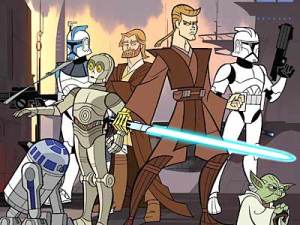
There may be plenty of great parts of the EU--The Old Republic, many of the video games and books--but anything that can produce this doesn't deserve serious scrutiny. I mean, really.
With any discussion of Star Wars comes the necessary discussion about what part of the universe you’re taking on. For the purposes of this series, I will be using what is known as G-canon (or George Lucas canon). G-canon is, to quote from Wookieepedia, “the six Episodes and anything directly provided to Lucas Licensing by Lucas (including unpublished production knows from him or his production department that are never seen by the public).” In other words, I’m going to ignore the Extended Universe (EU) of Star Wars. Any reference to the EU is more for knowledge sake than being relevant to my arguments.
Hardcore fans of Star Wars may question this decision and question my argument for the sheer fact that I’m excluding a wealth of source material.
The thing is that the six episodes of Star Wars paint the universe in terms of a very well-defined black-and-white morality. You are either good or bad, and if you’re listed as bad in George Lucas’ universe there is no reason to question the assumption. The EU authors have to work within this universe, and often their works have no grey areas, either.
With that in mind, much of the EU taking place in the same time period of the movies ends up with authors trying to show the Empire being evil and the Rebels being heroic. Because Lucas never felt it necessary to explain why the Empire was evil, these authors have elaborated upon it in terms of policies accepting of atrocities beyond the destruction of Alderaan and policies of xenophobia.
I hope that explains why it looks like I am ignoring sources that contradict my claims. As far as George Lucas intended it, there was nothing shown beyond what is in the films to indicate the way the Empire ruled. Any additions to the expanded universe that work as “evidence” of the Empire’s evil nature is really just trying to justify unexplained claims made within the movies.
The Galactic Republic Was Shitty
With my assumptions laid out, I’d like to start with the beginning of The Phantom Menace. Say what you want about The Phantom Menace, specifically about the inclusion of all the politics in it, but those boring senate scenes do at least give us some insight into what exactly happened in the Galactic Republic before Palpatine took over.
Which is to say: precisely jack shit.

The Galactic Senate chambers. If our history is any indication, there were countless fistfights on the floor of the Senate over the millennia.
The entire point of The Phantom Menace was how inept and ineffective the Senate actually was at getting to the bottom of the problems facing its member planets. People were being murdered on Naboo—and those who weren’t being murdered were being starved—and the Senate felt that the best solution was to form a committee.
This government was, at that point in time, run by corrupt bureaucrats with no interest in the people they served. It’s a plot point that is outright stated numerous times—George Lucas never was particularly subtle—and that directly led to the downfall of the Republic.
By the time we get to Attack of the Clones some serious shit had gone down and the galaxy was in a state of civil war. The fact that the Separatists broke off meant that the Republic was failing to some extent and people felt there had to be a better way. Nonetheless, they would never have seceded from the Republic had they not felt that there were unaddressed grievances. And what was the Republic’s answer to people who disagree with the way they do things? They started a war.
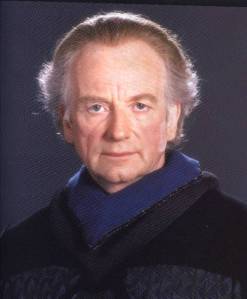
Why would you guys ever trust him? His last name is the same as Emperor Palpatine. Plus he just looks evil.
Granted, the whole point here is that Palpatine was subtly (or not) manipulating both sides toward war. But, even with those influences out of the picture, we can assume there were enough grievances that these Separatists felt were unaddressed to justify their secession. It is highly unlike that Palpatine, skilled politician as he was (because George Lucas made the characters tell us, repeatedly), could have caused their secession for no reason.
Let there be no doubt in your mind, then, that there had to be issues. Consider all the scenes within the Senate’s chambers and how utterly massive that room was. Then, take a quick glance at the room and notice how many separate species were present. Within the same country we cannot get our citizenry to agree on some issues that are relatively simple. This Republic was expected to rule over its constituency when said constituents were hundreds, if not thousands, of different species.
What’s most amazing about the Republic is how long it had supposedly existed before the events of the films; it’s stated that it existed for countless generations, the entire time presumably while settling the differences of its member species in a reasonably fair manner. Whatever it was that changed, the Senate clearly went from a body that was able to take action to a group of alien species standing in a room while holding their collective dicks.
But back to the war. The Republic, again, decided that the answer to people who disagree with their way of life is to start a war, for which there was a conveniently mass-produced clone army. Of course, nobody really asked why it was necessary, but it is stated that before the clones there was no standing army. This begs the question: how did the Republic defend itself in the past? After all, without some kind of military, how can the Republic maintain order and peace from both inside and outside the Republic?
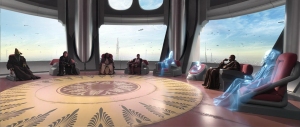
The Jedi Council is about as useful as the UN at keeping peace. Plus, they put an 18 year within their ranks. Aren't there Jedi far more deserving of a spot in that room than Anakin?
The Jedi, apparently, are the answer to this. But given how easily the Jedi are mowed down by regular ‘ol clone troopers in Revenge of the Sith, it’s hard to imagine that they could serve as the only military force of the Republic. While I have always had mixed feelings about the military, even I can admit that the thought of existing without a military is like putting a sign that says “freeGalacticRepublic – inquire within”.
Also, nobody seems to have an issue with the clone army. Seriously. I mean, I think Obi-Wan questions it for a second, but then its like he never even bothered. The ethical issues with the clone army alone should be enough to give you pause about the way the Republic works. After all, these are all clones of a dangerous bounty hunter who are specifically bred to become killing machines. Beyond that, they were genetically manipulated to age to maturity more quickly and to support the Republic unwaveringly. Riddle me this: on an ethical level, how are these soldiers any better or worse than the people seen serving in the Galactic Empire?
It’s also interesting that there is no mention in the G-canon of any kind of police force. It’s implied that the Jedi are the police, but then they are also called upon the serve as a military force. I think history has shown that when your military and police are the same, you’re kind of in trouble.
What all of this means is that it was only a matter of time before the Republic fell and something else rose to take its place. The logical choice of the citizens of the galaxy would be a government that was two things the Republic was not: first, capable of taking swift, decisive action to address everyday issues; second, capable of defending its citizens from any threat. The result was the Galactic Empire.
When Padme comments in Revenge of the Sith that liberty ends with thunderous applause, did it not occur to her that maybe the people knew that they were accepting a dictatorship, but figured it had to be a hell of a lot better than the Republic? Also, when Palpatine comments that the Jedi rebelled against him and attacked him, nobody in the senate was particularly shocked. I take that as an indicator that the Jedi were at the very least not a big part of everyday life and, at the worst, widely disliked. After all, if the Jedi had a public image as peacekeepers and defenders of justice and truth, don’t you think someone would have openly questioned Palpatine’s assertion that they had turned on him? Considering the way Lucas portrays them in the prequel trilogy, it’s no surprise. They’re condescending asses who sit up in their (ivory?) tower hoping they can think problems away.
Now, I know that there is that saying along the lines of “those who give up liberty for security deserve neither”, and in our world based upon our ethics, I’d totally agree. However, when you’re talking about ruling on the galactic scale, in terms of trillions upon trillions of people, it’s a different ball game. I am not arguing that more people justifies military dictatorships, at least not directly. But I am arguing that perhaps a system of government like a republic is not suitable when you are trying to bridge the gap between thousands of species on countless planets.
I don’t think any of you are dumb. So I doubt you’re sitting there asking “how the hell does this mean the Empire is better”. But an important part of realizing that the Empire got a bad deal in how they were portrayed is to recognize the ways in which the Republic was generally terrible (read: many). The Republic was rife with corruption, had no feasible way to defend itself from threats (except for the highly unethical clone troopers) and apparently left so much of its citizenry disenchanted with its aims that they felt no other recourse than to secede. I don’t intend on making my argument by solely saying that the Galactic Empire is bad, but the Republic was worse. I think there is genuine evidence that the Empire did more good than bad, but looking at the Republic can give you an idea of how disillusioned the galactic citizenry probably was.
Look for the next part of the series, entitled The Empire Is in a Bad Neighborhood.
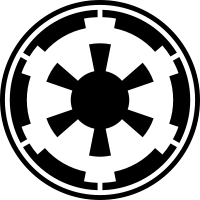
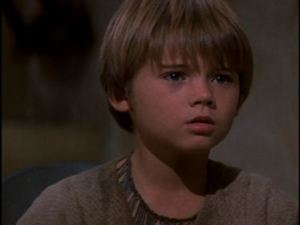
The Galactic Empire was already introduced in The Star Wars: Story Synopsis , finished by George Lucas in May 1973 , simply as “an empire”. In the revised The Star Wars: Rough Draft , the galaxy-wide totalitarian government was known as the “New Empire”, ruled by the ruthless Emperor Cos Dashit with his power-hungry minions, Darth Vader and Crispin Hoedaack . In the later drafts, Governor Hoedaack became Grand Moff Tarkin and Cos Dashit was replaced by Emperor Palpatine . The rough draft was followed by The Star Wars: First Draft , where the Empire was called “New Galactic Kingdom”. The empire was finally named “Galactic Empire” in Adventures of the Starkiller, Episode I: The Star Wars , which was followed by the first Star Wars film, Star Wars Episode IV: A New Hope . In the present, the huge success of the Star Wars franchise has turned the Empire into the best-known example of a ” galactic empire ” theme in science fiction.